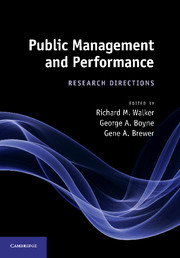Book contents
- Frontmatter
- Contents
- List of figures
- List of tables
- Notes on contributors
- 1 Introduction
- 2 Extending goal ambiguity research in government: from organizational goal ambiguity to programme goal ambiguity
- 3 Budgets and financial management
- 4 Organizational structure and public service performance
- 5 Red tape: the bane of public organizations?
- 6 Managerial networking, managing the environment, and programme performance: a summary of findings and an agenda
- 7 Public service motivation and performance
- 8 Organizational diversity and public service performance
- 9 Performance management: does it work?
- 10 Strategy: which strategic stances matter?
- 11 Methods
- 12 Conclusion: enriching the field
- Index
- References
1 - Introduction
Published online by Cambridge University Press: 05 July 2014
- Frontmatter
- Contents
- List of figures
- List of tables
- Notes on contributors
- 1 Introduction
- 2 Extending goal ambiguity research in government: from organizational goal ambiguity to programme goal ambiguity
- 3 Budgets and financial management
- 4 Organizational structure and public service performance
- 5 Red tape: the bane of public organizations?
- 6 Managerial networking, managing the environment, and programme performance: a summary of findings and an agenda
- 7 Public service motivation and performance
- 8 Organizational diversity and public service performance
- 9 Performance management: does it work?
- 10 Strategy: which strategic stances matter?
- 11 Methods
- 12 Conclusion: enriching the field
- Index
- References
Summary
Introduction
The performance of public services is one of the central policy issues across the globe. Response to the global financial crisis during the late 2000s was typically led by government – in the UK and USA governments stepped into the banking system and either shored up these institutions or nationalized them, whereas in China the Communist Party sought to spend its way out of recession. The emergence of SARS in the early 2000s and the subsequent swine flu epidemic were public health crises managed and coordinated by public organizations: some of these were international agencies, such as the World Health Organization, but the majority of the heavy lifting was done at the coal face by public organizations and health agencies. The majority of crises, whether they are perpetrated by people (e.g. terrorist attacks, mass genocide or nuclear accidents) or result from natural catastrophes (e.g. earthquakes, tsunamis or famine), require public action. These global and high-impact examples are the tip of the iceberg – public services touch the majority of people in advanced and developing economies on a daily basis: children require schooling, the elderly need personal care and assistance, rubbish needs collecting to prevent public health incidents and the public needs to be confident that the water they drink is potable and the food they eat is safe. Moreover, government must protect its people from internal and external threats such as civil war and foreign invasion. In short, public services shore up our world and therefore knowledge about strategies to improve their performance is central to the good of society.
Information
- Type
- Chapter
- Information
- Public Management and PerformanceResearch Directions, pp. 1 - 33Publisher: Cambridge University PressPrint publication year: 2010
References
Accessibility standard: Unknown
Why this information is here
This section outlines the accessibility features of this content - including support for screen readers, full keyboard navigation and high-contrast display options. This may not be relevant for you.Accessibility Information
- 13
- Cited by
